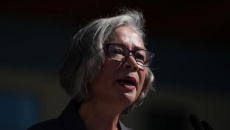The proposed law would also allow political parties to run on municipal ballots in Edmonton and Calgary as soon as next year.
"It's so crazy. It's very clear that this government is now operated on spite and arrogance," Nenshi told reporters in Lethbridge on Thursday evening.
"They're clearly doing this out of revenge on the voters of Calgary and Edmonton who didn't vote the way they wanted them to."
Nenshi, 52, was elected mayor of Calgary in 2010 and won three terms before deciding to bow out before the 2021 municipal election.
He and MLAs Kathleen Ganley, Sarah Hoffman and Jodi Calahoo Stonehouse, as well as Alberta Federation of Labour president Gil McGowan, took part in the NDP's first leadership debate.
Alberta Municipal Affairs Minister Ric McIver says the new powers are justified to ensure fair elections and accountability from municipal leaders, and they would only be used as a last resort.
"My most fervent wish is that this authority is never ever used. We don't want to intervene in municipal matters," McIver told reporters before the bill was introduced in the legislature Thursday.
Nenshi said councils are democratically elected. He said current Calgary Mayor Jyoti Gondek probably received more votes than every United Conservative Party MLA in Calgary.
"To me, that is no way to run a government. This really highlights that this government is fundamentally disinterested in governing as a government, but actually only working on their whims and their needs, their self-indulgence."
The board of directors of Alberta Municipalities said political parties in local elections is a bad idea and something most Albertans don't want.
"Alberta’s local governments have no interest in fighting with the province. Nor do they want to be caught in the middle of an Alberta-Ottawa 'forever war,'" the association said in a statement.
Ganley, a former justice minister, said the move is ridiculous.
"Basically, they want to be in control of everything. Municipal politics is an incredibly important place. It shouldn't be the little league to provincial politics the way the UCP wants to make it," she said.
Hoffman said municipal governments have been clear on their opposition to the idea.
"The local councillors don't want it. We don't want it," she said.
"I think Danielle Smith is very keen on taking more power. This is one of the reasons she's brought in this legislation."
The bill makes other changes. It would ban the use of electronic voting tabulators, forcing municipalities to hand-count ballots, in order to better protect the integrity of the vote, said McIver.
"If we can reduce doubt in the public's confidence about who is declared the winners, we think that rises above all other considerations."
In the past, Smith has taken aim at the province’s two largest cities, saying in February that single-use plastic bylaws showed city councils had gone off the partisan rails.
"Because they’re getting far more political and far more ideological, there probably needs to be more transparency about that," she said at the time.
Two weeks ago, Smith’s government also introduced a bill that would give it the power to veto any deal between the federal government and provincial entities, including municipalities and post-secondary schools.






